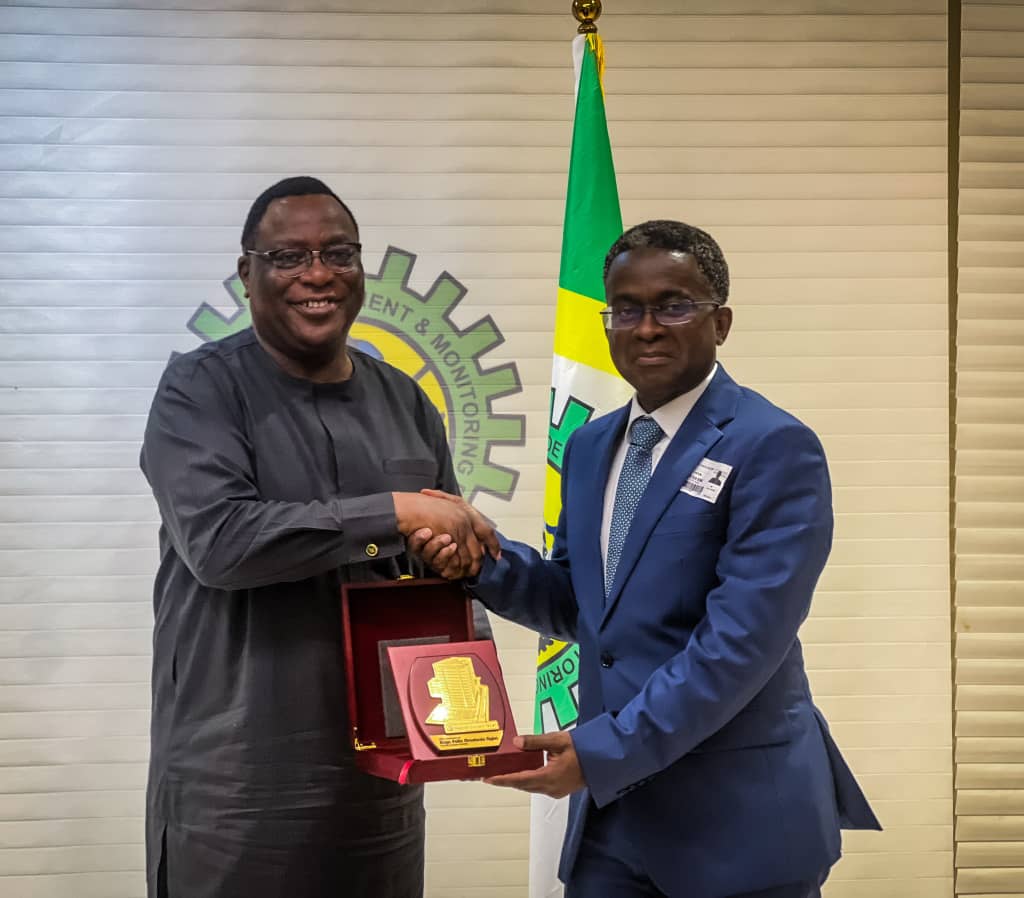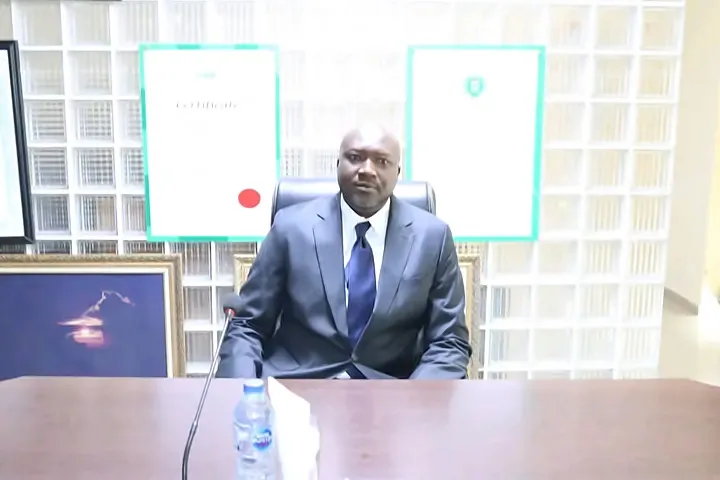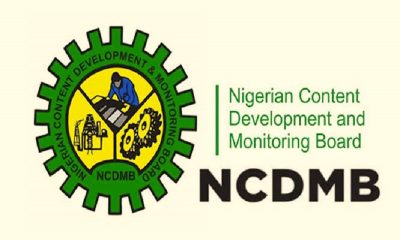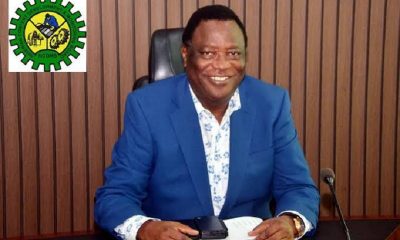General
NCDMB Gets $1m Return on Investment From Nedogas

By Adedapo Adesanya
The Nigerian Content Development and Monitoring Board (NCDMB) has received a return on investment (ROI) valued at $1 million from Nedogas Development Company Limited (NDCL) following one of the board’s strategic investments in the oil and gas sector.
The cheque was presented to the Executive Secretary of the agency, Mr Felix Omatsola Ogbe, by the Nedogas Chairman, Mr Emeka Ene, when he visited the Nigerian Content Tower in Yenagoa, Bayelsa State.
The partnership with Nedogas, one of NCDMB’s 15 strategic investments is geared towards actualizing the federal government’s aspirations in key areas of the oil and gas industry. Most of the projects were targeted at actualising the Decade of Gas programme.
Nedogas Development Company Limited (NDCL) is a joint venture between Xenergi Limited and NCDMB Capacity Development Intervention Company. As part of the project, Nedogas Development Company Limited (NDCL) constructed and commissioned a 300 MMscfd Capacity Kwale Gas Gathering (KGG) and injection facility located in the Umusam Community, near Kwale in Delta State, Niger Delta, Nigeria.
The KGG Facility was designed to handle stranded gas resources in Nigeria’s OML56 oil province by providing the opportunity for independent operators in the area to monetize natural gas from their fields through the gas gathering, compression, injection and metering infrastructure of the KGG for quick market access.
Nedogas is one of the several strategic and successful investments of the NCDMB funded from the Nigerian Content Development Fund (NCDF), in line with the Board’s mandate to build capacity and catalyze local projects in the Nigerian oil and gas industry as enshrined under the Nigeran Oil and Gas Industry Content Development (NOGICD) Act.
Speaking at the presentation, Mr Ogbe stated that the success story of NEDOGAS at Kwale, Delta State could be replicated in other oil- and gas-producing communities to minimise gas flaring. He declared the Board’s readiness to continue collaborating with the company.
“Their model should be extended to other parts of the country where gas flaring is continuing. They have shown that with the modular system, we can quickly remove flaring from our operations in Nigeria.”
He confirmed that NCDMB had continued to receive briefings from its investment partners, adding that “we are still waiting for them to come back with success stories. Some of them are near completion and have not started operations yet.”
Chairman of NEDOGAS, Mr. Emeka Ene conveyed the company’s excitement in returning part of the credit and profit, adding that this “proves that NCDMB’s investment was a success and they are getting back that investment.”
He added that “we look forward to further collaboration with the NCDMB to expand the scope,” adding that “NCDMB is now doing effectively and practically and tangibly what it was set up to, which is to impact the economy by direct interventions. That is the way the economy can grow, improve the gas infrastructure in such a way that is sustainable despite the tight economic conditions.”
The value propositions of the Nedogas project include the total eradication of flared gas and conversation of environmental pollutants into products of value and the creation of a strategic gas gathering hub and injection node for quick access to the market for gas owners to monetize gas. Other benefits include the provision of alternative gas supply to the western flank of the OB3 line to add to the volumes of economic sustainability and increase Nigeria’s Gross Domestic Product (GDP), among other reasons.
Some of NCDMB’s notable third-party investments include Waltermith’s 5000 barrels per day modular refinery in Imo State, Azikel Group’s 12,000 barrels per day hydro-skimming modular refinery in Gbarain, Bayelsa State and Duport Midstream’s 2,500 barrels per day modular refinery in Edo State.
Other investments include Better Gas Energy for LPG terminal and gas distribution, a partnership with Rungas Prime Industries Limited to establish a cooking gas cylinders manufacturing plant in Polaku, Bayelsa State and Alaro City in Lagos and a partnership with Butane Energy to deepen LPG utilization in the North.
There was also the partnership with BUNORR Integrated Energy Limited in Port Harcourt, Rivers State to produce 48,000 litres of base oil per day and a partnership with the Nigerian National Petroleum Corporation (NNPC) Limited, Brass Fertilizer and Petrochemical Company Limited and DSV Engineering to establish a 10,000 Ton Methanol Production Plant, Odioama, Brass, Bayelsa State.
General
NIMASA Rallies Stakeholders’ to Develop National Action Plan

By Adedapo Adesanya
The Nigerian Maritime Administration and Safety Agency (NIMASA) has pledged its commitment to provide the regulatory leadership, technical coordination, and stakeholder engagement required to successfully develop and implement a robust National Action Plan on maritime decarbonization in Nigeria.
The Director General of the agency, Mr Dayo Mobereola, made this known during the National Stakeholders’ workshop on the development of a National Maritime Decarbonization Action Plan, further describing the workshop as a critical step in actualising the Federal Government’s blue economy and climate objectives.
Represented by the Executive Director, Operations, Mr Fatai Taiye Adeyemi, the NIMASA DG underscored the significance of the IMO GreenVoyage2050 Project, a technical cooperation initiative /designed to support developing countries in implementing the IMO GHG Strategy.
According to him, the National Action Plan being developed will reflect national realities, leverage existing capacities, address identified gaps, and align with broader economic and environmental priorities of the federal government.
Mr Mobereola stressed that “this transition is not merely about compliance with international obligations, it is about safeguarding our marine environment, protecting public health, strengthening the blue economy, and ensuring that our maritime industry remains competitive and future-ready”, the DG said.
Also speaking at the event was the Technical Manager of the IMO GreenVoyage2050 Project, Ms Astrid Dispert, who highlighted that the overarching objective of the initiative is to advance a coherent and globally aligned regulatory framework to accelerate maritime decarbonization.
She also emphasised that NIMASA plays a pivotal role in driving the project at the national level.
The IMO GreenVoyage2050 Project provides technical expertise and institutional support to assist countries in developing and implementing National Action Plans that promote sustainable shipping practices, encourage investment in clean technologies, and strengthen capacity for long-term emissions reduction.
Through this collaboration, the federal government is advancing deliberate steps towards maritime decarbonization, reinforcing its commitment to global climate goals and ensuring a cleaner, greener, and more sustainable future for the sector.
General
BPP Mandates Digital Submission for MDAs From March 1

By Adedapo Adesanya
The Bureau of Public Procurement (BPP) has directed all Ministries, Departments and Agencies (MDAs) to comply with its digital submission process effective March 1.
The directive was contained in a circular signed by the Director-General of the Bureau, Mr Adebowale Adedokun, noting that the move was part of the bureau’s commitment to digital transformation and paperless governance.
It explained that the transition followed an earlier circular of Aug. 4, 2025, which introduced electronic submission procedures.
According to the bureau, it has successfully moved from physical filings to a dedicated e-mail service for document submissions and is now advancing to a more robust and integrated system.
The circular announced the inauguration of the BPP Digital Submission Portal, a web-based platform designed to enable MDAs submit procurement-related documents directly to the Bureau.
It stated that the automated platform would streamline the submission process, enhance transparency and ensure accelerated tracking of procurement-related documents and petitions.
“With effect from March 1, all MDAs will be required to use the portal to submit requests for ‘No Objection’ Certificates, approvals for ‘No Objection’ for special procurements, clarifications and status updates on submissions,” the bureau said.
It added that the portal would be hosted on the Bureau’s official website and would become fully operational from the effective date.
The bureau warned that physical submissions or manual hand-deliveries would no longer be prioritised and would eventually be rejected following the full transition to the digital platform.
It urged accounting officers to brief their procurement departments and ICT units on the development to ensure seamless processing of procurement activities from March 1.
It further advised MDAs to contact the Bureau via its official email for information on the onboarding process and integration into the portal.
The bureau emphasised that full compliance by all MDAs was required to ensure a smooth transition and avoid delays in the implementation of the 2026 fiscal year procurement processes.
General
Senate Seeks Removal of CAC Boss Hussaini Magaji

By Adedapo Adesanya
The Senate has asked President Bola Tinubu to remove the Registrar General of the Corporate Affairs Commission (CAC), Mr Hussaini Ishaq Magaji, from office.
The Senate Committee on Finance, while passing a resolution in Abuja on Thursday, accused Mr Magaji, a Senior Advocate of Nigeria (SAN), of failing to honour the Senate’s invitations to account for the finances of his agency.
“He refused on so many occasions to honour our invitation to appear before this committee.
“We have issues with the reconciliation of the revenue of CAC.
“Each time we invite him, he gives us excuses,” the Chairman of the committee, Mr Sani Musa, said as the committee passed the resolution.
CAC was part of a group of agencies that the House of Representatives Public Accounts Committee (PAC) recommended zero allocation for the year 2026, for allegedly failing to account for public funds appropriated to them.
The committee, at an investigative hearing held two weeks ago, accused CAC and some other ministries, departments and agencies (MDAs) of shunning invitations to respond to audit queries contained in the Auditor-General for the Federation’s annual reports for 2020, 2021 and 2022.
The PAC chairman, Mr Bamidele Salam, stated that the National Assembly should not continue to appropriate public funds to institutions that disregard accountability mechanisms, saying this will create fiscal discipline and strengthen transparency across federal institutions and conform with extant financial regulations and the oversight powers of the parliament.
“Public funds are held in trust for the Nigerian people. Any agency that fails to account for previous allocations, refuses to submit audited accounts, or ignores legislative summons cannot, in good conscience, expect fresh budgetary provisions. Accountability is not optional; it is a constitutional obligation,” he said.
-

 Feature/OPED6 years ago
Feature/OPED6 years agoDavos was Different this year
-
Travel/Tourism10 years ago
Lagos Seals Western Lodge Hotel In Ikorodu
-

 Showbiz3 years ago
Showbiz3 years agoEstranged Lover Releases Videos of Empress Njamah Bathing
-

 Banking8 years ago
Banking8 years agoSort Codes of GTBank Branches in Nigeria
-

 Economy3 years ago
Economy3 years agoSubsidy Removal: CNG at N130 Per Litre Cheaper Than Petrol—IPMAN
-

 Banking3 years ago
Banking3 years agoSort Codes of UBA Branches in Nigeria
-

 Banking3 years ago
Banking3 years agoFirst Bank Announces Planned Downtime
-

 Sports3 years ago
Sports3 years agoHighest Paid Nigerian Footballer – How Much Do Nigerian Footballers Earn

















